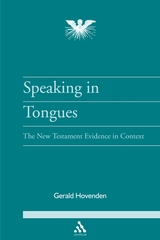Gerald Hovenden: Speaking in Tongues
 Gerald Hovenden, Speaking in Tongues: The New Testament Evidence in Context (Sheffield, England: Sheffield Academic Press, 2002), 181 pages.
Gerald Hovenden, Speaking in Tongues: The New Testament Evidence in Context (Sheffield, England: Sheffield Academic Press, 2002), 181 pages.
In this book Hovenden provides a well balanced and informed study into a phenomenon that is gaining increasing interest and acceptance within the Christian community. What started has a distinctive among Pentecostals in the early 20th century and later spilled over into the charismatic communities of Mainline and Evangelical churches is now the topic of much scholarly discussion. This is something that was rare in the past among biblical or systematic theologians.
Hovenden himself is a prime example of the expanding use of tongues in both the private and corporate spheres of spirituality. In his introduction Hovenden relates how this work grew “out of a long-standing interest” (1) in the phenomenon of tongues. He then goes on to tell of his early experiences as an Anglican discovering and then experiencing tongues. This window that Hovenden has opened on himself gives his study an added aspect of respectability. For Hovenden, tongues is not simply an academic study, although he does top notch academic work on the topic. It is, though, a dynamic and personal experience of the divine Spirit; one that he says is a “regular and … valuable part of my personal prayer life” (1). Academic study that flows out of such a profound experience is a breath of fresh air to an often stagnant discipline.
In this small work Hovenden bravely attempts to establish what Luke, Paul, and the earliest Christians actually believed tongues to be (3). In short he is trying to determine if tongues was viewed by the above mentioned groups as glossolalia, xenolalia, or something other than human language, i.e. angelic languages. He does this by examining the evidence of tongues in the ancient world, both historical and textual, to determine whether the early Christian communities understood tongues in light of what they knew of such occurrences in the Pagan and Jewish worlds. He admits that such a study will inevitably lead to comparisons of the Lukan and Pauline understandings of tongues, although this is of secondary importance with only a small section in chapter 4 devoted to such comparison.
The first section of his book is devoted to ‘tongues like’ activity in the pre- and para-Christian material. This is a survey of examples of ecstatic speech from both Pagan and Jewish literature. In dealing with Pagan examples Hovenden takes the reader through such ancient writers as Euripides and Plato, as well as fragments from the Delphic and other ancient oracles. He also deals with movements and groups that were more contemporaneous with first century Christianity such as the Mystery Religions and the writings of Livy (59 BCE – 17 CE). Hovenden shows that while there is ample evidence in the ancient Greco-Roman world for ecstatic speech there seems to be little hard evidence of such speech that was unintelligible. Instead they were almost certainly in Greek.
Category: Spirit, Winter 2005


